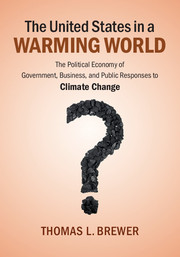 The United States in a Warming World
The United States in a Warming World Book contents
- Frontmatter
- Dedication
- Contents
- List of boxes
- List of figures
- List of tables
- List of maps
- Preface
- Acknowledgments
- Permissions
- Introduction: a chronological overview
- Part I Issues
- Part II Domestic economics and politics
- Part III National government policies
- Chapter 5 Regulating carbon dioxide and other greenhouse gases
- Chapter 6 Facilitating energy technology innovation and diffusion
- Chapter 7 Strengthening international cooperation
- Part IV The future
- References
- Index
Chapter 7 - Strengthening international cooperation
Published online by Cambridge University Press: 05 October 2014
- Frontmatter
- Dedication
- Contents
- List of boxes
- List of figures
- List of tables
- List of maps
- Preface
- Acknowledgments
- Permissions
- Introduction: a chronological overview
- Part I Issues
- Part II Domestic economics and politics
- Part III National government policies
- Chapter 5 Regulating carbon dioxide and other greenhouse gases
- Chapter 6 Facilitating energy technology innovation and diffusion
- Chapter 7 Strengthening international cooperation
- Part IV The future
- References
- Index
Summary
Climate change threatens us all; therefore, we must bridge old divides and build new partnerships to meet this great challenge of our time.
US President Barack Obama (2009)There are two fundamental political economy facts that must be taken into account in efforts to address climate change through international cooperation:
Climate change mitigation through reductions in GHG emissions is a global public good. The benefits of mitigation are thus available to all countries, regardless of whether they participate in the mitigation efforts.
Because the international nation-state system is highly decentralized and generally lacking in formalized enforcement mechanisms, it is a challenge to gain participation and compliance in international climate change agreements.
It is therefore tempting for countries to be free riders through non-participation and/or non-compliance, and these core conditions pose formidable obstacles to the achievement of environmentally effective, economically efficient, and politically viable international agreements.
Yet, progress in the development of an international climate regime has nevertheless been made incrementally over more than two decades. In order to understand the evolution of the system and the constraints on it, it is necessary to consider some key issues and the context in which they are addressed. As we have seen in the previous two chapters, international issues overlap with regulating emissions (Chapter 5) and advancing technologies (Chapter 6); but in addition, there is a wide range of other international issues – including institution-building, financing adaptation and mitigation projects in developing countries, and monitoring, reporting, and verifying emissions and mitigation actions.
- Type
- Chapter
- Information
- The United States in a Warming WorldThe Political Economy of Government, Business, and Public Responses to Climate Change, pp. 226 - 260Publisher: Cambridge University PressPrint publication year: 2014
